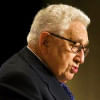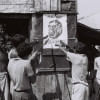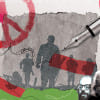Henry Kissinger’s role in 1971

Henry Kissinger, one of the most influential yet controversial political figures of the 20th century, passed away in 2023, leaving behind a legacy that continues to spark heated debates. Lauded by some as a master of diplomacy and realpolitik, he remains, in the eyes of others, a war criminal who should have been held accountable for his actions. In The Trial of Henry Kissinger, Christopher Hitchens meticulously builds a case against Kissinger, arguing that his policies and decisions—from his role in extending the Vietnam War to his backing of right-wing coups, complicity in genocide, and orchestration of covert operations—led to mass suffering across the globe. The Bangladesh chapter of the book is particularly damning, exposing the cold indifference and realpolitik calculations that led to one of the most horrifying atrocities of the 20th century.
In December 1970, the people of East Pakistan (now Bangladesh) overwhelmingly voted for self-rule under the leadership of Sheikh Mujibur Rahman and the Awami League. However, instead of honouring the democratic mandate, the Pakistani military, led by General Yahya Khan, launched Operation Searchlight on March 25, 1971. What followed was an unrelenting campaign of mass killings, systematic sexual violence, and forced displacement. Conservative estimates place the death toll at 300,000, though many argue the real number was closer to three million.
As reports of massacres spread, one of the earliest and most powerful condemnations came from Archer Kent Blood, the US Consul General in Dhaka. Blood and his team sent a series of telegrams to Washington detailing the atrocities being committed by the Pakistani military. In the telegrams, they pleaded the US to take a stand against the Pakistani government. The message read:
"Our government has failed to denounce the suppression of democracy. Our government has failed to denounce atrocities…Our government has evidenced what many will consider moral bankruptcy..."
This was signed by dozens of diplomats, making it the strongest internal protest ever recorded within the US State Department. Yet, Nixon and Kissinger dismissed it outright. Kissinger, obsessed with using Pakistan as a backchannel to China, saw Yahya Khan as an indispensable ally. Instead of acting against genocide, Kissinger chose silence and complicity. In fact, the US government, under Kissinger's guidance, actively supported the Pakistani military by supplying them with weapons.
Kissinger also made a callous remark in a private conversation, referring to Bangladesh as a "basket case," illustrating his dismissive attitude toward the country's plight and people. Between March and December 1971, the Pakistani military conducted some of the most gruesome acts of ethnic and political cleansing of the 20th century. Bangalee intellectuals were specifically targeted and executed, Hindu minorities were slaughtered, and millions of women were subjected to rape as a weapon of war. While the world condemned the atrocities, Nixon and Kissinger continued to stand by Pakistan.
His secret conversations with Nixon reveal racist and derogatory remarks about Bangalees and Indians, showing his complete disregard for human lives. Even when the then US Ambassador Kenneth Keating urged the administration to publicly condemn Pakistan's brutality, Nixon said to Kissinger that Keating had been "taken over by the Indians." Kissinger, for his part, at the height of the genocide in late April sent Yahya a message praising him for "delicacy and tact."
As the crisis deepened, India, overwhelmed by millions of Bangalee refugees, prepared to intervene militarily. On December 3, 1971, India officially entered the war to assist the Mukti Bahini. In response, Kissinger orchestrated a dangerous and reckless move. He deployed the aircraft carrier USS Enterprise into the Bay of Bengal. This was meant to intimidate India and deter its intervention, but it failed.
Mukti Bahini with help from India swiftly defeated Pakistan, leading to the creation of an independent Bangladesh on December 16, 1971. But Kissinger's hostility toward Bangladesh did not end there.
When Mujib sought international recognition and aid for the war-ravaged country, the US remained distant. Kissinger saw Mujib's government as an embarrassment, resenting the exposure of US complicity in genocide. In November 1974, Kissinger made a brief eight-hour visit to Dhaka, where he refused to acknowledge the role of the US in Pakistan's actions.
Hitchens' book meticulously builds a case against Kissinger, arguing that his actions in Bangladesh, Chile, Vietnam, and East Timor amount to war crimes. Kissinger's secret involvement in overthrowing democratically elected leaders, his orchestration of military coups, and his support for genocidal regimes paint the picture of a man who viewed human lives as collateral damage in his grand strategy. As Bangladesh continues to push for global recognition of the 1971 genocide, the question remains: will history hold Kissinger accountable, or will his crimes fade into the shadows of realpolitik?
Kollol Kibria is an advocate, human rights activist, and political analyst. He can be reached at [email protected].
Views expressed in this article are the author's own.
Follow The Daily Star Opinion on Facebook for the latest opinions, commentaries and analyses by experts and professionals. To contribute your article or letter to The Daily Star Opinion, see our guidelines for submission.


 For all latest news, follow The Daily Star's Google News channel.
For all latest news, follow The Daily Star's Google News channel. 










Comments